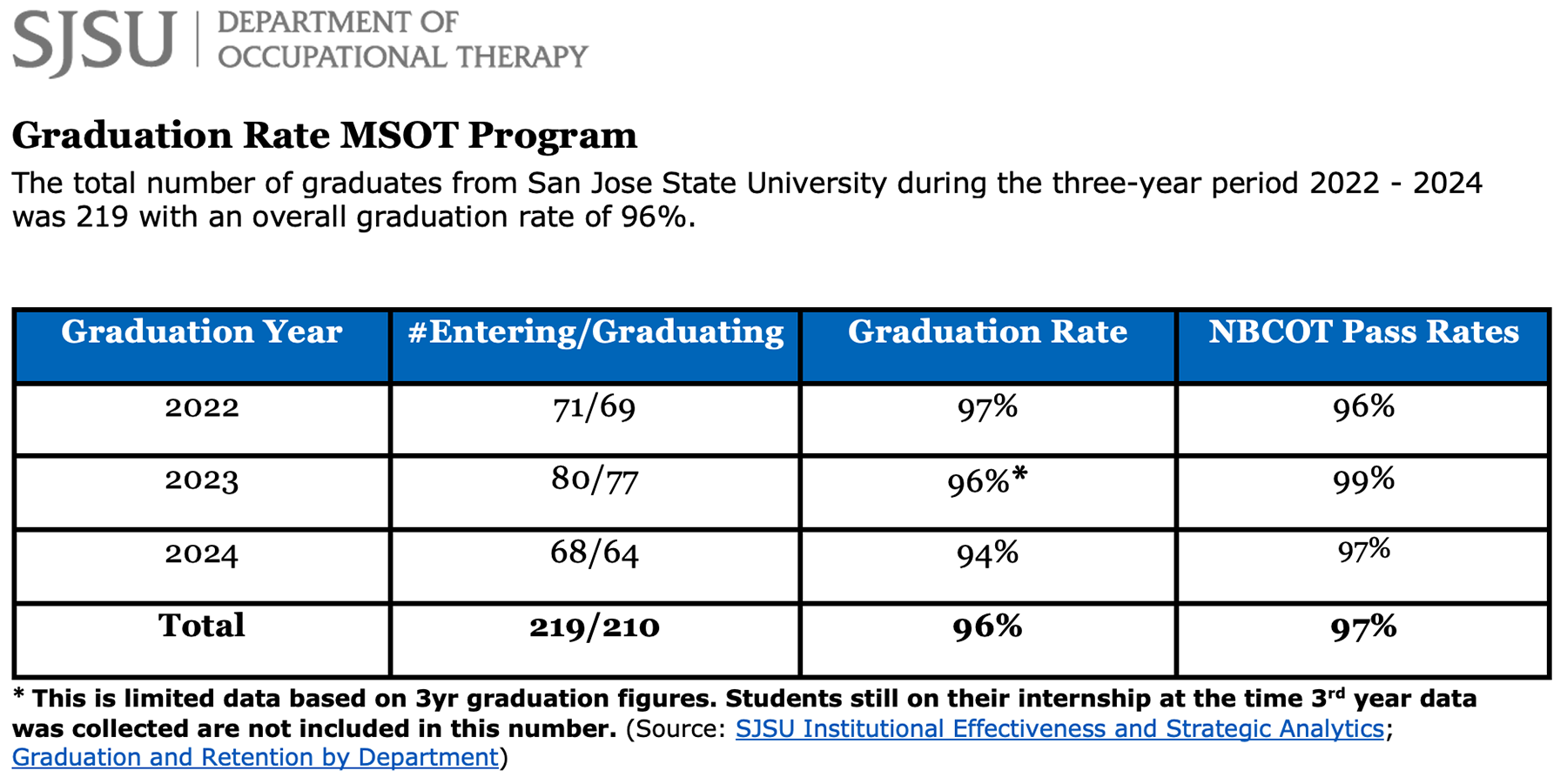Master of Science in OT
The Master of Science in Occupational Therapy program curriculum is designed for students who have earned a baccalaureate degree in a discipline other than occupational therapy. It enables the student to obtain the education and degrees necessary to be eligible to practice as an occupational therapist. This program is offered primarily on the San Jose State University campus but students will also have fieldwork and practicum experiences off campus. Once the Master of Science degree in occupational therapy is completed, the student is eligible to sit for the national certification examination. Successful completion of the examination qualifies the candidate to apply for national certification and state licensure.
The Occupational Therapy Program at San José State University is accredited by the Accreditation Council for Occupational Therapy Education (ACOTE) of the American Occupational Therapy Association (AOTA). It is the oldest accredited Occupational Therapy program in the California State University system.
Our Impressive Accreditation
SJSU's program is accredited by the Accreditation Council for Occupational Therapy
Education (ACOTE) of the American Occupational Therapy Association (AOTA). In 2016
the Accreditation Council of Occupational Therapy Education (ACOTE) awarded us a 10-year
accreditation based on the strength of our academic program. This is the longest accreditation
period awarded and we are incredibly proud of this accomplishment. Learn more about
ACOTE at 7501 Wisconsin Avenue, Suite 510E Bethesda, MD 20814, by calling (301) 652-6611;
emailing at: [email protected]; or by visiting www.acoteonline.org.
 (Photo description: Total number of MSOT graduates from SJSU OT Dept. during the three-year
period 2022 - 2024.)
(Photo description: Total number of MSOT graduates from SJSU OT Dept. during the three-year
period 2022 - 2024.)
NBCOT School Program Performance Data
Please check Applications and Admissions for important updates here regarding the application process and advising sessions.
Review the MSOT Program Advising Overview [pdf]
Application Deadlines
We accept applications once per year beginning on October 1st. The deadline for submitting applications and application materials is on March 1st of each year. However, we recommend submitting the application as soon as possible as we admit on a rolling basis and can therefore fill the class before March 1st. In that event, we will close the application process.
You may begin the application process on OTCAS beginning in mid July.
Students must also apply to the university via Cal State Apply (separate from the program application). Please see deadline dates on the Graduate Admissions & Program Evaluations (GAPE) website.
For Fall 2025 program, applications will become available October 1st.
Important Note About the GRE:
GRE is no longer a required component of the application for the MSOT program.
Notice for re-applicants 2024-2025 [pdf]
Fall 2025 Mandatory Intent to Enroll
Fall 2025 admitted students must accept their admission by:
- letting us know if you plan to attend SJSU, by accepting your offer of admission and stating ‘yes’ you plan to attend SJSU and Intent to Enroll and
- paying the mandatory, nonrefundable and nontransferable, $200 enrollment deposit by the June 1, 2025 in order to register for Fall 2025 classes.
The $200 enrollment deposit will be applied towards your admitted term tuition and fees once you enroll in Fall 2025 classes.
If you need any help completing the Next Steps proceess, please email the Graduate Enrollment Management.
Visit Mandatory Intent to Enroll webpage
Program Resource Links
- Applications and Admissions
- Information and Criteria for Acceptance
- Application Checklist [pdf]
- Forms
- Frequently Asked Questions
- MSOT Degree Roadmap [pdf]
- MSOT Course Descriptions [pdf]
- Graduate Writing Support Services
- Required Prerequisite Courses
- SJSU OT Academic Catalog
- Tuition and Other Fees
- Cost of Attendance for MS in OT
(Sample illustration)
Criminal Background Check
A felony conviction may affect a graduate’s ability to sit for the NBCOT certification examination and may preclude attainment of state licensure. Some practicum and fieldwork sites may also perform background checks and refuse internships to students with a felony conviction. Students who have a prior felony conviction are urged to contact the above mentioned certification and licensing boards prior to the start of the program to determine their potential to practice as an occupational therapist. While we recognize this to be a privacy issue, it is recommended that the student disclose this information to the Fieldwork Director before fieldwork placements are sought.
International Experience
All students in the OT program will be required to participate in an international experience as a part of their academic program. For students seeking an alternative to the study abroad requirement or students who have substantial international experience within 5 years of entering San Jose State University please see the College of Health and Human Sciences (CHHS) website for petition forms.
Curriculum Design
The curriculum is composed of six clusters:
- Occupation—the core of the profession
- Foundations for occupational therapy practice
- Professional development
- Practice in the Community
- Research and knowledge development
- Practice of occupational therapy.
Six curricular threads reflect knowledge and skills that run through all courses in the curriculum. They include the following (see section below; more details here on Curriculum Threads [pdf]):
Progression and Graduation Requirements [pdf]